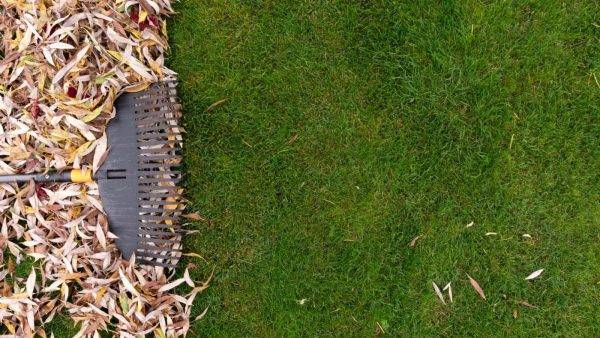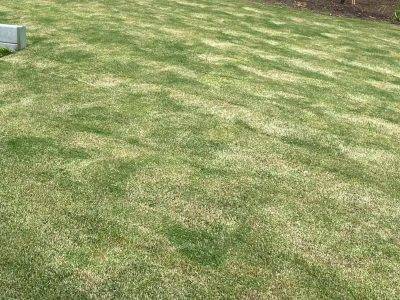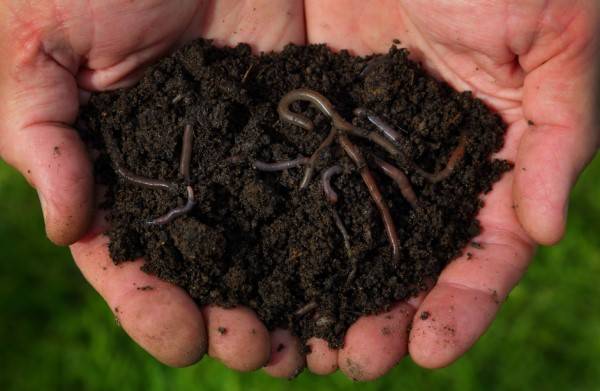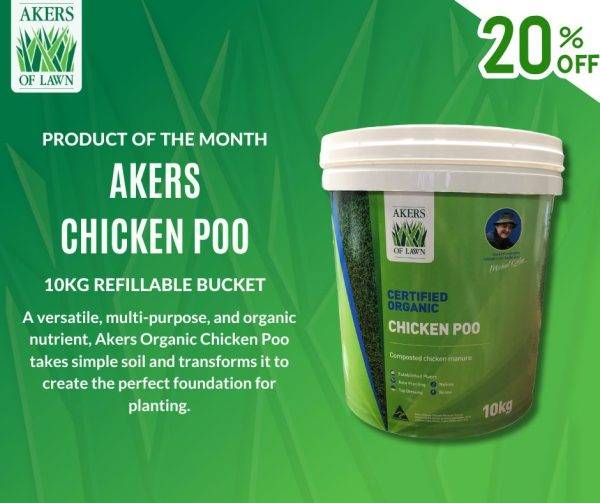Akers Monthly – April 2024

Preparation is key
Autumn Lawn Maintenance
The warm weather is coming to an end! As it starts to cool down you will notice that the growth of warm season lawns will slow down concurrently with the temperature decrease. If your lawn isn’t healthy and prepared it may be vulnerable to compaction, weeds, frost and fungus. By doing some extra care and maintenance through autumn you can strengthen your lawn and give it the best chance to stay strong through the winter season.
Fertilising:
Fertilising during autumn is crucial to giving your lawn a final boost before the winter weather hits. Fertilising will encourage prolonged growth, thick coverage, and extended colour. The thicker and stronger a lawn is, the less susceptible it is to weeds and shade issues. Fertilising now is particularly important for Couch lawns, as it is not recommended to fertilise them while they are dormant during winter.
We would recommended using our Akers Organic Based Fertiliser available here. Alternatively, give us a call and book in with us to do a fertilise for you as part of our follow up service.
Mowing:
Warm season lawns such as Couch, Buffalo and Kikuyu will slow down in their growth as the weather cools down. We recommend continuing to mow once a week until you notice the growth significantly slowing down. You can then start to reduce the frequency between mows as needed to help tidy and reduce weeds spreading.
If you have a cool season grass such as Kentucky Bluegrass or Fescue, make sure you are continuing to mow frequently, as they grow faster in the cool temperatures.
If you have a warm season grass, and if you haven’t already, we recommend adjusting your mowing height up a notch until the soil warms up in spring. A longer leaf will help the lawn to absorb more sunlight, allowing it to produce more food for itself and stay strong, particularly through the shade that the cooler months bring.

Mower Burn

Torn leaf due to blunt mower blades
Important Notes on Mowing:
- It is recommended not to remove more than one-third of the grass blade length at a time, this will allow your lawn to maintain its health and thickness, as well as avoiding mower burn which is important to avoid coming into winter.
- Avoid mowing while your lawn is damp or wet. This can damage the lawn by tearing and bruising the leaf, it can form ruts and an uneven finish to the foundation.
- If wet clippings are left on the lawn, they can smother the grass. Make sure to use a catcher when mowing, or rake up the clippings once you have finished.
- If the tips of the leaf start looking torn after a mow it could be an indication that your mower blades need sharpening or replacing.
Watering:
Don’t put your hoses away just yet! Although the weather may start to become cooler there is no guarantee there won’t be more hot weather just around the corner. Monitor your lawn and the weather to ensure your lawn stays well hydrated. To check if your soil is getting enough water use a moisture meter, dig into the soil to manually check, or use a catch cup to measure how much water the rain or sprinklers are supplying.
Get Ahead of the Weeds:
If you haven’t already, pre-emergent herbicides need to be applied ASAP for best results. Cooler weather can activate weed seeds and they will soon start germinating and sprouting. If you already have some weeds appearing unfortunately a pre-emergent won’t help control these and you will need to apply an appropriate post-emergent weed killer or remove them by hand. In this instance we would still recommend also applying a pre-emergent, as it will help limit the seed germination of the already sprouted weeds as they try to spread.
Testing & Treating your Soil:
If your soil is dry and off colour now is a great time to give it a boost so that it can stay strong through the cool, wet season. Strong healthy soil is crucial to having strong healthy lawn and plants.
If you are not sure how healthy your soil is then a pH test will help!

The pH scale shows how acidic or alkaline your soil is, with 7 being neutral. The ideal pH for healthy lawn growth and colour is between 6 – 7. Optimal pH is essential for effective uptake of nutrients.
Soil that is too acidic (pH of 5.5 or below) may cause your lawn to be unable to take in nutrients from the soil. Alternatively, soil that is too alkaline (pH of 8 or higher) can cause your lawn to not only become stressed but more susceptible to weeds and diseases.
You can test your soil at home using a Manutec Soil pH Test Kit or a Soil pH Meter, available instore and online.
To help lower your soil pH we recommend adding organic matter, such as our Winter Blend or Akers Soil Booster and Lawn Food, as they contain sulphur which assists in lowering pH.
To help raise your soil pH we recommend adding a granular lime such as this one, as it helps neutralise the acid in the soil.
If you have hard or clay soil, autumn is also a great time to core your lawn to alleviate compaction. This allows for better water penetration, nutrient spread, and oxygen absorption into the soil. And while you’re at it, why not apply some gypsum? Gypsum assists in breaking down clay soil, and works best with regular yearly applications. This is particularly beneficial if you have recently cored or aerated your lawn as the granules are able to get into the lower soil profiles easier.
We offer Coring either on its own or with another service such as applying gypsum and/or fertiliser. Give us a call to book in! Otherwise our 10kg Akers Granular Gypsum is available for purchase instore or online.
Earthworms

Worms are integral for keeping grass and soil healthy! The tunnels that worms create by moving help break up the soil, creating natural aeration that along with their assistance in breaking up the thatch layer, allows for water and nutrients to easily reach the root zone. Worms also eat some of the problem pests such as Nematodes, which are parasites that feed on grass roots, along with harmful bacterial, fungi, microbes, and thatch. A worm’s digestive process is then able to convert their food into usable nitrogen for plants, which in turn supports plant health.
Want to encourage worm activity?
Seaweed and Gone® is an exclusive and unique product to Akers of Lawn, developed by Brad Akers himself! It was purposefully designed as an all-in-one fertiliser, weed killer, and weed deterrent. Our spray is versatile, multipurpose, and good for your lawn.
Containing a mixture of seaweed-based liquid foliar fertiliser and three-way herbicide, Seaweed and Gone® encourages strong plant growth and excellent colour without the risk of burning. With the addition of Humectants, an even spread is ensured to encourage easy absorption into the plant’s root system through the soil. The extra inclusion of essential plant nutrients, such as nitrogen, potassium, iron, manganese, and magnesium, along with the inclusion of organic kelp and seaweed, helps the soil by building beneficial microbes and most importantly encouraging worm activity to enrich the growth process.
Please note that Seaweed and Gone is only available as a service. If you are after a product you can apply yourself that can help encourage worm activity Akers Soil Builder is a great alternative.
Product of the Month

Akers of Lawn has paired with Adelaide’s Garden Guru, Michael Keelan, to package Akers Organic Chicken Poo, a natural product that has all the benefits of chicken poo and much less mess.
Akers Organic Chicken Poo is environmentally-friendly and aims to:
- Improve the structure of the soil by encouraging worm activity and increasing microbial activity
- Promote faster and more sustained growth for plants
- Increase plant health, leading to better resistance to pests and diseases
- Improve water retention in the soil
Due to their varied diet, chicken poo provides valuable nutrients needed for efficient plant uptake, including high levels of calcium, and a slow-release source of both macro and micro-nutrients.
Dal’s Gardening Tips
- Now that it is cooling down, you can begin planting things like Asian Greens, Broad Beans, Broccoli, Carrot, Cabbage, Celery, Swedes and Turnips to name a few!
- Autumn is a great time to plant natives and bulbs.
- Watch your soil’s moisture. Sometimes Mother Nature’s rain just isn’t enough to penetrate the soil in your garden beds. Use a moisture meter to help guide you.
- Make sure to keep an eye out for Black Beetle and Fungus.
- If you haven’t already, coring your lawn before winter is highly recommended to ensure better water penetration, stronger root growth, and better absorption of nutrients and oxygen into the soil.
- Ensure you are raking your lawns free of fallen leaves.
Do you have any lawn or garden questions?
We want to hear from you!
Send us any questions or topics you want covered and they may get featured in our next Akers Monthly!
As always, thank you for your support!
Dal, Jacqi and the Akers of Lawn team
